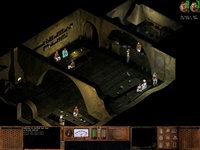| |
Site Navigation
Main
News
Forums
Games
Games Database
Top 100
Release List
Support Files
Features
Reviews
Previews
Interviews
Editorials
Diaries
Misc
Download
Gallery
Music
Screenshots
Videos
Miscellaneous
Staff Members
Privacy Statement
|
|
Bioware's KotOR page has a link to an interview at PC Gameworld with James Ohlen (Lead Designer), and Casey Hudson (Producer/Project Director) about the PC version of Star Wars: Knights of the Old Republic. The opening paragraph refers to KotOR as a MMORPG which isn't a good start so here's a snip from further into the discussion:[PC Gameworld] One of the most amazing aspects of this game is the Light/Dark balance. I must admit that there were a few times where I became frustrated because something I thought would get me light side points earned dark ones instead. The depth here is amazing, and the system seems to work near-flawlessly. How did you come up with this scheme, and, in your opinion, how well does it work?
[James] Itís a very simple system. The player starts at 50 on a 100 point scale and moves up and down the scale when he chooses good or evil dialogue options. As the player moves along the scale, his characterís skin texture reflects the changes. In the original system a player would receive a set amount of points according to the severity of his actions (-3 for a minor evil act, -10 for a major evil act). We eventually changed it so that the points were also based on the playerís location on the scale. The closer a player approached the pinnacle of lightside or darkside, the more significant his actions had to be to continue down the path he had chosen. For example, if a player was at 10 on the scale, stealing money from an innocent was only going to have a negligible effect (-1 on the scale); he would have to kill an innocent or betray someone that trusted him if he really wanted to see results.
The popularity of the lightside/darkside scale was something that caught us by surprise. While we knew people were going to have fun with it, we didnít think it would be as popular as it ended up being. |
|
|





 Star Wars: KotOR - Interview @ PC Gameworld
Star Wars: KotOR - Interview @ PC Gameworld